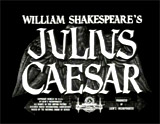
|
Julius Caesar (1953)
In director/writer Joseph Mankiewicz's and MGM's black
and white epic historical drama - it was an adaptation of William
Shakespeare's historical play 'The Tragedy of Julius Caesar' about
political intrigue, power and betrayal in ancient Rome; much of the
focus within the film was on the character of high-ranking Roman
Senator Brutus rather than Julius Caesar; it illustrated a specific
period in Roman history when the republic came to an end and transitioned
to imperial dictatorship:
- the film opened with a quotation in the prologue
from Plutarch's LIVES: "Upon Caesar's return to Rome, after defeating
Pompey in the civil war, his countrymen chose him a fourth time
counsel and then dictator for life...thus he became odious to moderate
men through the extravagance of the titles and powers that were
heaped upon him"
- an arrogant Caesar (Louis Calhern) returned to Rome
in 44 BC, victorious after defeating Pompey; he was greeted by
his faithful wife Calpurnia (Greer Garson), and the citizenry celebrated
with rejoicing and revelry by placing garlands on Caesar's statues;
however, Caesar was warned that his
life was in danger by a blind soothsayer ("Beware
the Ideas of March")
- with other elites and politicians, an introspective,
troubled, and indecisive Brutus (James Mason) conferred
with his brother-in-law - ambitious
and crafty Roman Senator Caius Cassius (John Gielgud), who urged
and pressured him to join with a group of schemers who had
formed a conspiracy of Liberators to free Rome of the autocratic
Caesar; Cassius spoke the famous line: "The fault, dear Brutus,
is not in our stars, but in ourselves, that we are underlings"
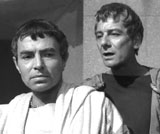
Brutus (James Mason) with Caius Cassius (John Gielgud)
|

Cassius: "The fault, dear Brutus, is not in our stars, but in ourselves,
that we are underlings"
|
- one of the conspirators, Casca (Edmond O'Brien)
reported to them that Caesar's loyal protege and right-hand man
Mark Antony (aka Antonius) (Marlon
Brando) had offered Caesar a crown three times during the victory
ceremonies at the arena; Caesar made a big show of refusing the
crown, possibly hoping that the crowd would convince him to accept;
Casca regarded Caesar's rejections as a cheap theatrical trick
("it was mere foolery"); afterwards, Caesar swooned and
passed out and looked weak as he left the arena ("he fell down
and foamed at the mouth and was speechless")
- the conspiratorial plan was to assassinate the
tyrannical, ambitious, popular and triumphant military leader Caesar
due to his rising popularity and increased hero status following
his defeat of his military rival Pompey; Cassius summarized his
intentions: "We will shake him, or worse days endure"; the
elimination of Caesar, a potential self-appointed dictator if crowned
king, was intended to prevent him from abusing the Roman citizenry
if he ever became Emperor
- Brutus rejected the excessive idea of murdering
Mark Antony along with Caesar: "For Antony is but a limb of Caesar.
Let us be sacrificers, but not butchers, Caius...And for Mark Antony,
think not of him, for he can do no more than Caesar's arm when
Caesar's head is off"; Brutus' sympathetic wife Portia (Deborah Kerr)
worried about his troubled state of mind when he wouldn't divulge
that he was making a decision about participating in Caesar's assassination
- Caesar was warned a second time
that his life was in danger, this time by his wife Calpurnia who
told him of her nightmarish, fearful bloody omens of his death (including
his statue with 100 spouts of pure blood), and urged
him to remain home; when her dream was reinterpreted as a "vision
fair and fortunate" with good tidings for the future of Rome, Caesar
decided to not yield to his wife's fears
- in 44 BC on the Ides of March
(March 15th), as Caesar approached the Senate house to be crowned,
he was brutally stabbed to death by multiple persons beginning
with Casca, including by the hand of Brutus who delivered
the last fatal blow to his stomach (with Caesar's famous line: "You
too, Brutus?"); shouts rang out: "Liberty! Freedom! Tyranny is
dead!"; the conspirators dipped their hands in Caesar's blood: "Let
us bathe our hands in Caesar's blood"
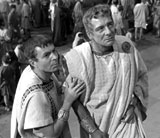
Brutus and Cassius Plotting
|
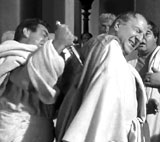
Casca - the First to Stab Caesar
|
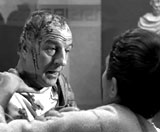
Caesar to Brutus: ("Et tu, Brute?")
|
- Caesar's vengeful supporter Mark Antony was allowed
to approach without harm and view Caesar's body; with tremendous
self-control, he made peace and shook hands with each of the conspirators;
he was also reluctantly given permission to speak after Brutus
at Caesar's 'funeral' memorial, but then in private over Caesar's
corpse, Antony apologized and angrily vowed revenge for the 'foul
deed': "Woe to the hand that shed this costly blood"
- the betrayer Brutus defended his actions with a
well-accepted winning speech from a pulpit to appease the hysterical
masses, about his patriotic and dedicated love for Rome and his
fear of Caesar's dangerous and threatening ambitions ("Brutus'
love to Caesar was no less than his....Not that I loved Caesar
less, but that I loved Rome more");
he vowed that he was protecting Rome, and asked the audience if
he had offended anyone ("If any, speak, for him have I offended")
but no one replied that he had ("Then none have I offended")

Brutus' Speech to Appease the Hysterical Masses
|

Antony Carrying Caesar's Body
|
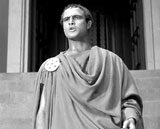
"Friends, Romans, countrymen, lend me your ears!"
|
- the end of Brutus' speech was interrupted by Mark
Antony who appeared behind him carrying Caesar's corpse; he began his
eloquent oration with: "Friends, Romans,
countrymen, lend me your ears!"; he
first told the crowd that he had come to bury Caesar, not to praise
him: ("I come to bury Caesar, not to praise him. The evil that
men do lives after them, the good is oft interred with their bones.
So let it be with Caesar")
- Antony's manipulative speech convinced the commoners
that Caesar had been good for Rome, and that the people should
sympathize with the fallen hero who had been butchered after refusing
the crown three times. He inflamed the crowd when he showed them
Caesar's ripped robe where Brutus had stabbed him ("This was the
most unkindest cut of all"). He also read to them Caesar's will
that included payments of 75 drachmas to
all citizens. The mob was persuaded to drive the traitorous self-serving conspirators
out of Rome
- a title card was superimposed on the screen: "The
conspirators having fled, there came to Rome the young Octavius
whom Caesar had adopted as his son. So did he and Antony divide
the power between themselves and prepare to make war against Brutus
and Cassius for the empire of the Romans"; two
opposing armies were formed: the conspirators vs. the superior
forces of Mark Antony, who had formed a triumvirate with Lepidus
(Douglass Dumbrille) and Caesar's adoptive son Octavius (Douglass
Watson) to rule over Rome; the new leaders decided who would die
with the issuance of death sentences for enemies of the state (including
the purge of 100 Roman Senators)
- at their military camp near Sardis, Brutus argued
bitterly with Cassius, accusing him of dishonesty (accepting bribes
of gold) and corruption; they buried their differences after
Brutus informed Cassius that his upset, devoted wife Portia had
killed herself ("swallowed fire" or hot coals to protect her husband),
that night, Brutus experienced an apparition - it was Caesar's
ghost calling him an "evil spirit" and portending: "Thou shalt
see me at Philippi"
- during a battle between the two factions, the forces
of Brutus and Cassius were overpowered at the Battle of Philippi
in 42 BC, and the two separately committed suicide to avoid capture;
first, Cassius ordered his bondman Pindarus (Michael Ansara) to
thrust into his chest using the same dagger that ran through Caesar;
knowing that the end was near for himself after seeing Cassius'
corpse, Brutus impaled himself on his own sword held by Strato
(Edmund Purdom)

Stabbed with His Own Dagger
|
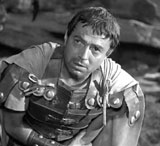
Lethally Impaled On His Own Sword
|
|
Suicidal Deaths of Cassius and Brutus
|
- the film concluded
with Mark Antony standing over Brutus' body with praise for him,
even though he was one of the assassins: "This was the noblest Roman
of them all. All the conspirators, save only he, did that they
did in envy of great Caesar. He only, in a general honest thought
and common good to all, made one of them. His life was gentle,
and the elements so mixed in him that Nature might stand up and
say to all the world - 'This was a man.'"
|
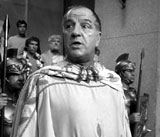
Julius Caesar (Louis Calhern)
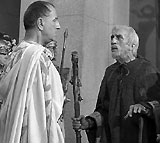
Blind Soothsayer to Caesar: "Beware the Ides of March"
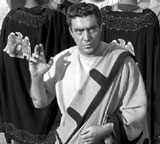
Casca (Edmond O'Brien)
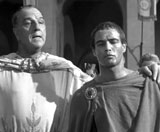
Caesar with His Right-Hand Man Mark Antony (Marlon Brando)
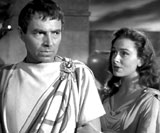
Brutus' Worried Wife Portia (Deborah Kerr)
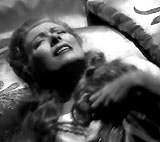
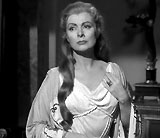
Bloody Nightmares of Caesar's Death Suffered by His Concerned Wife
Calpurnia (Greer Garson)
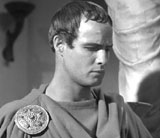
Mark Antony Viewing Caesar's Dead Body
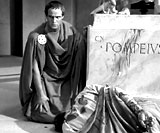
In Private, Mark Antony Vowing Revenge
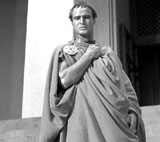
Mark Antony's Impassioned Speech for Caesar to the Crowd
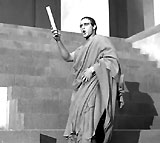
Mark Antony Showing Off Caesar's Will
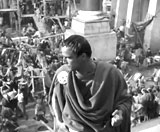
Leaving the Mob in a Frenzied State

(l to r): Octavius (Douglass Watson) with Mark Antony - Two Leaders of
Rome's New Triumverate

A Ghostly Apparition of Caesar Appeared to Brutus
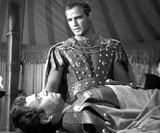
Antony's Praise Over Brutus' Body
|
















